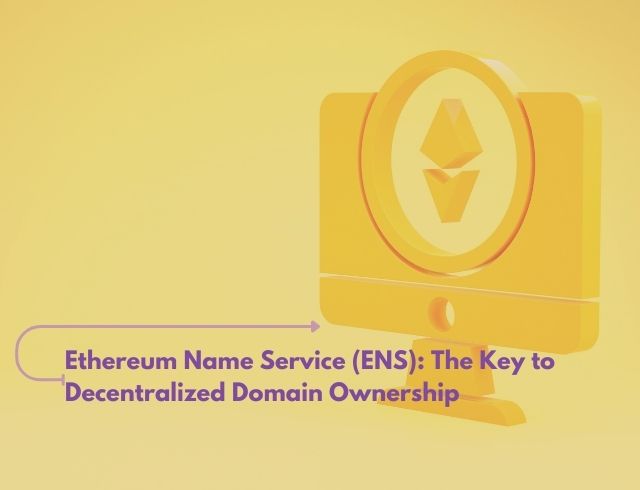

Decentralized technologies have created many innovations, one of which is the Ethereum Name Service (ENS). This way, users are capable of having decentralized domain ownership: there will be no centralized authorities controlling all these domains. This makes it possible for everyone, consumers and companies, to control their information, which is stored on decentralized databases, in compliance with decentralization concepts that increase privacy, security, and independence in the online environment.
What exactly is ENS?
ENS, Ethereum Name Service, is a distributed, permissionless, and applications-specific naming registry that is designed over Ethereum. It enables users to replace cumbersome large cryptcurrency addresses with easily understandable names. Instead of inputting a nearly unrecognizable Ethereum address (as in the example: “0x12345…”), users can get a simple name (like “yourname.eth”) thus making Ethereum payments and interaction with decentralized applications (dApps) as easy as with any other cryptocurrency. Although ENS domains are a new type of name resolution system, they can also work like regular web domains In other words, people can build decentralized websites with ENS domains.
Decentralized Domain Ownership
The decentralized operation through ENS ensures that the owner directly does the ownership of every domain without the need for domain registries. This ensures:
- Security: No single entity can grab or suppress your domain today. ENS domains have properties that distinguish them from traditional domains because they are built using the Ethereum blockchain, they cannot be controlled or altered from the outside.
- Privacy: To the contrary of conventional domain registrations that involve sharing private information, users have the choice of servicing domains while at the same time shielding their identity.
- Autonomy: Through ENS, users can have complete control of the domain management aspect such as the deletion, restructuring, and renewal of the domain without intervention from intermediaries agencies.
How ENS Domains Revolutionize the Digital Experience
Ultimately, by replacing long Ethereum addresses and being capable of decentralized website hosting, ENS changes users’ experience with blockchain applications. Due to the ENS domains, users can associate cryptocurrency wallets, websites, DApps, social networks, other resources, and profiles with one comfortable name. It innovates the cryptocurrency transaction system and promotes the use of the decentralized system beyond the borders of finance.
ENS and NFT Integration
Despite it being a relatively young platform, to a significant extent, ENS is already becoming intertwined with non-fungible tokens (NFTs). Just like any other ENS domain, you can use it as a name for your NFT collection adding another level of ownership to the item. This integration only provides a sneak peek of how ENS is customizable and can easily integrate with other systems and protocols within the blockchain ecosystem.
Bermuda Unicorn: NFT Marketplace – Decentralized Domains
Bermuda Unicorn is an active Virtual Space for the digital community allowing selling art pieces and avatars, joining or creating NFT marketplaces, Microblogging in 3D, and much more. With such relatively decentralized technologies like ENS emerging, places such as Bermuda Unicorn are the perfect place to experiment with such tech. Specifically, Bermuda Unicorn adopts the most advanced NFT and virtual world techniques to enable users to purchase and appreciate experienced virtual items. Visit Bermuda Unicorn To find out more about decentralized domains and its relation with NFT in a digital economy.
Conclusion
Ethereum Name Service (ENS) is changing the way people interface with blockchain projects and aims for decentralized domain name system. As security, privacy, and autonomy, ENS is effectively laying the groundwork for a new and more decentralized version of the internet. As other platforms such as Bermuda Unicorn continue to evolve it’s going to be even more important for the integration of ENS for both businesses and individuals within the decentralized ecosystem.